Fishery Owners of the Northwest
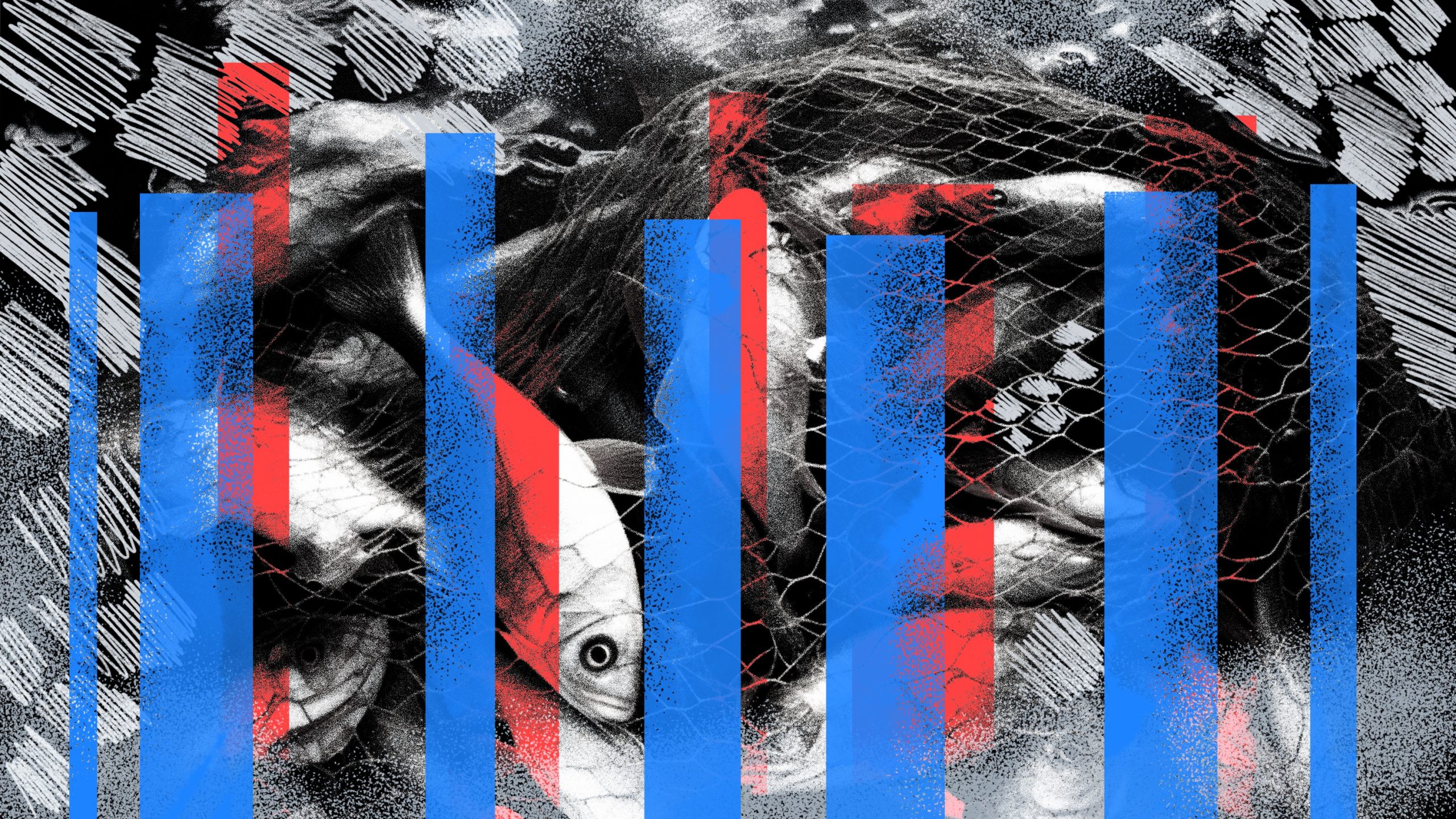
Fishermen-entrepreneurs play a significant role in the life of Northwest Russia. “Chronicles. Media” presents an overview of the largest businessmen in this industry from the Barents to the Baltic Seas.
The revenue of the largest fish harvesting and processing companies in Northwest Russia in 2022 amounted to more than 153 billion rubles (1,6 bln.euro), and the total profit exceeded 35 billion rubles (360 mln.euro), calculated by “Chronicles”.

Who earned the most?
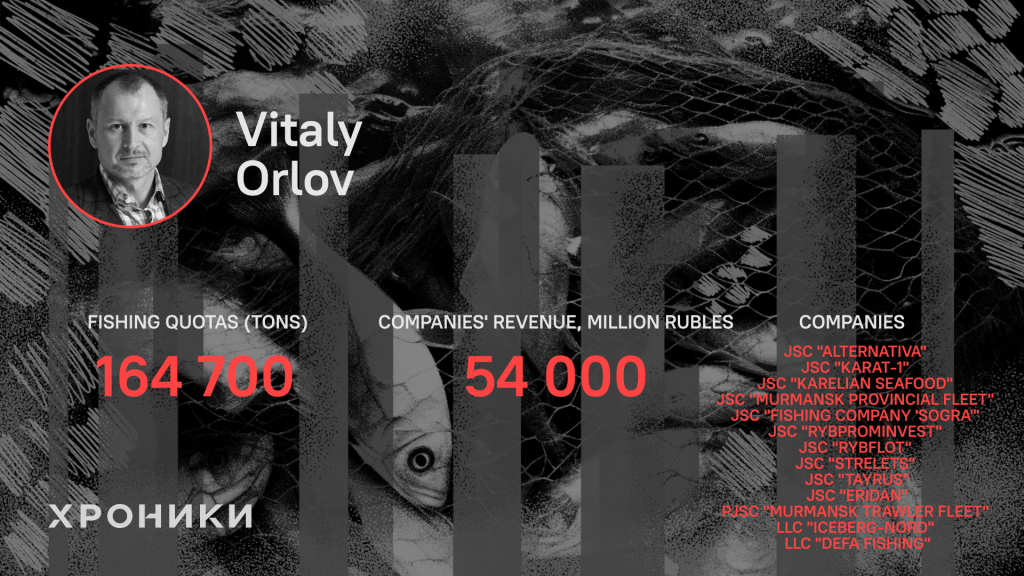
The first place goes to the holding “Norebo” of Vitaly Orlov. Orlov is the only official dollar billionaire on this list. Bloomberg reported in 2017 that sanctions helped the entrepreneur become rich. Although a significant portion of the holding’s products were exported, the embargo boosted demand within Russia. However, in 2022, the Norwegian television channel NRK reported that Orlov bypasses the sanctions by selling fish from one of the Norwegian companies, which resells the goods under its own brand.
Investigative project by Mikhail Khodorkovsky’s political platform ‘Dossier’ in 2023 reported that ‘Norebo’ may be providing its vessels to Russian special services to cover maritime sabotage against neighboring states. The publication noted that the holding expanded aggressively, acquiring small companies and thus increasing fishing quotas. Moreover, almost all of ‘Norebo’s’ assets are pledged to Sberbank, meaning, in other words, to the state.
Another significant detail: according to the ‘Dossier’ source, 10% of the holding belongs to a fellow student of Russian President Vladimir Putin, lawyer Nikolay Egorov.
‘Norebo’ is the largest fishing company not only in Northwest Russia but also, according to Forbes magazine for 2019, in the entire country. The company’s revenues in the Northwest amounted to 54 billion rubles (560 mln.euro), with a profit of almost 17 billion rubles (180 mln.euro) (according to the ‘Kontur. Focus’ counterparty verification service for 2022).

Second place goes to the Karelian senator Igor Zubarev. According to the latest available declaration, his personal income for 2021 amounted to more than 2 billion rubles (21 mln.euro). In the ranking of the wealthiest government officials, according to Forbes magazine for 2021, the United Russia party member held the eighth position.
‘Chronicles’ also found out that in February 2022, the senator transferred all his companies to nominees, such as Petrozavodsk deputy Vitaly Markov. Until the end of 2023, Zubarev’s main nominee, holding all his fishing assets, was his longtime associate Igor Chevychalo. However, at the end of 2023, the business was transferred to the St. Petersburg management company ‘Svinin and Partners.’ It is owned by Vladimir Svinin, who also owns the major developer ‘Okhta Group.’ The entrepreneur is involved in business dealings, for example, with the son of the Federation Council Speaker Valentina Matviyenko, Sergey. The management company of the entrepreneur also holds shares of hidden owners in some fishing enterprises controlled by the family of the Moscow Region Governor Andrey Vorobyov.
In addition to his wealth, Zubarev is known for actively concealing his family, but ‘Chronicles’ found them and reported on it in 2023.
The income of the senator’s fishing companies amounted to 17.7 billion rubles (180 mln.euro), with a profit of 5.8 billion rubles (60 mln.euro).
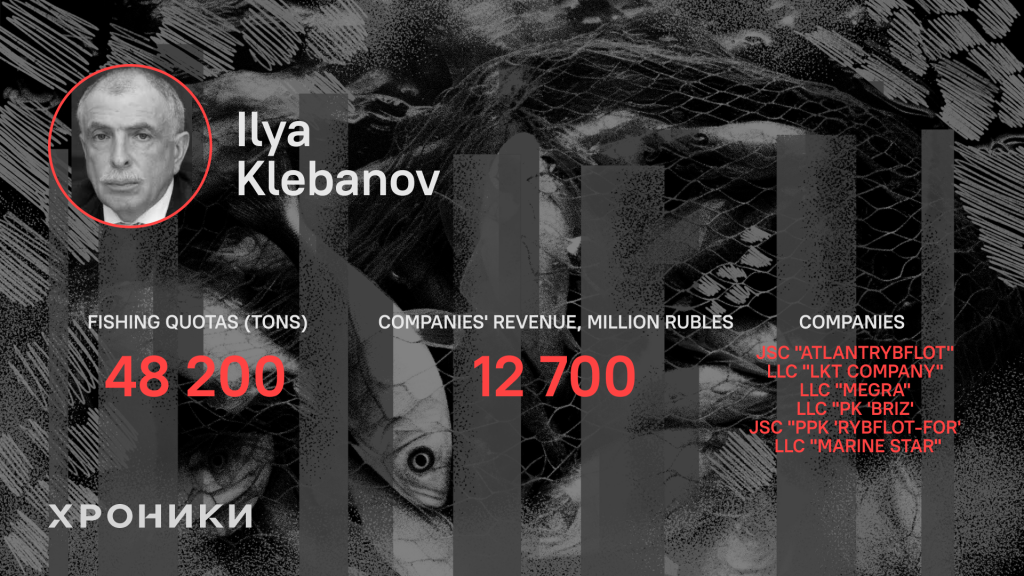
The third person on our list is probably the most well-known. It is the former presidential envoy to the Northwestern Federal District, Ilya Klebanov, and his family. Journalists reported that while the head of the family held this position, his relatives were accumulating fishing and port assets.
In 2019, Forbes placed Klebanov and his family in ninth place in the ‘Kings of the Seas’ rating. Over the last four years, the companies of the former government official in the Northwestern Federal District alone increased revenue by 12.7 billion rubles (120 mln.euro). The profit amounted to 2.5 billion rubles (26 mln.euro).
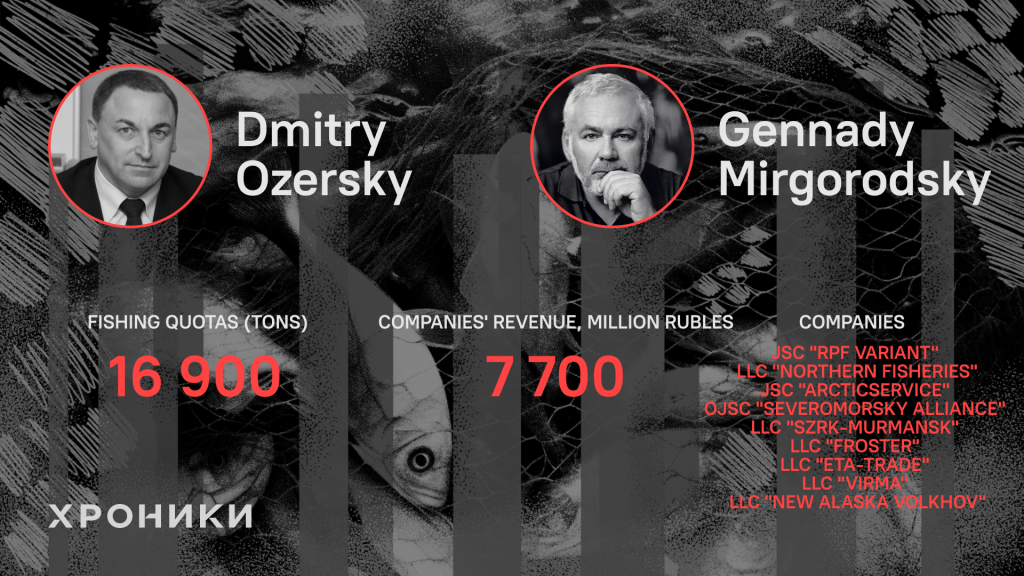
In fourth place are the companies owned by Gennady Mirgorodsky and Dmitry Ozersky. Historically, these entrepreneurs are involved in crab fishing, but they also catch fish. In Forbes’ ‘Fish Kings’ rating, they hold the third position.
Ozersky is known for his famous neighbor. As journalists reported, the entrepreneur has an apartment in the St. Petersburg mansion of Kushelov-Bezborodko, located in the very center of the city on the banks of the Neva River. It was in the same building that Alexei Navalny’s team found the apartment of the then Prime Minister of Russia, Dmitry Medvedev, in 2017.
Ozersky and Mirgorodsky are the only ones in this list who made it into Forbes‘ ’50 Russians with the highest dividend income for 2019-2021.’ According to the magazine, the entrepreneurs received a total of 17.8 billion rubles (180 mln.euro) over three years. The income from all fishing assets of the businessmen amounted to 7.7 billion (80 mln.euro), with a loss of 2.4 billion rubles (25 mln.euro).
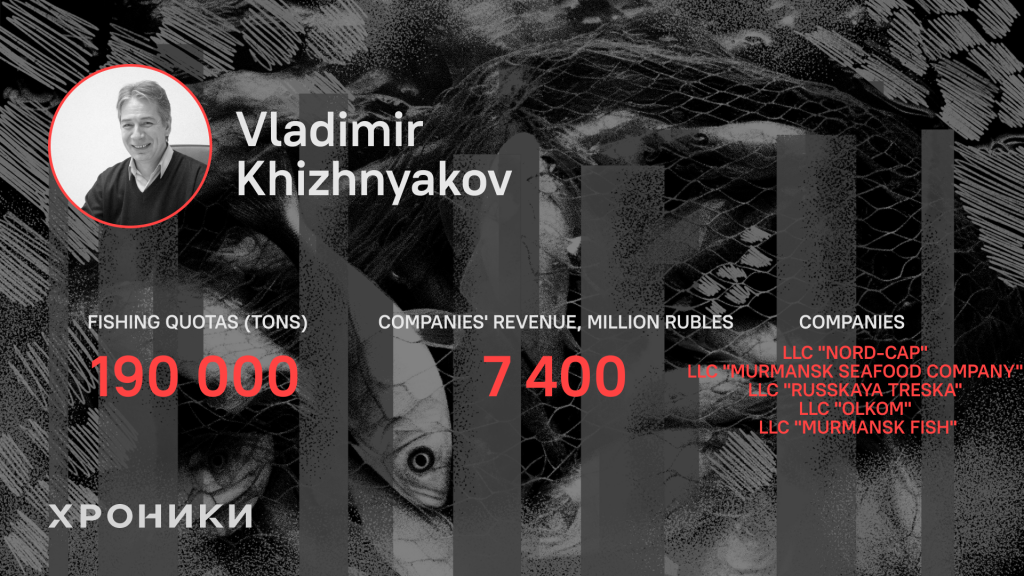
Fifth place goes to Vladimir Khizhnyakov, a resident of Murmansk. The income of the entrepreneur’s companies amounted to 7.4 billion rubles (77 mln.euro), with a profit of 1.2 billion rubles (12 mln.euro).

Sixth place goes to the first representative from the Kaliningrad Region on this list. It is the head of the ‘Za Rodinu’ (‘For the Motherland’) holding and the similarly named fish processing plant, Sergey Lyutarevich. Uncharacteristic for other participants in the list, a significant portion of the entrepreneur’s income comes specifically from fish processing, primarily the production of sprats, which are highly popular among Russians.
Lyutarevich decided to support his business by acquiring a mandate as a deputy of the Kaliningrad Oblast from ‘United Russia’ political party, as well as the position of chairman of the regional Chamber of Commerce and Industry. At one time, the businessman also headed the city of Svetly and the Ministry of Agriculture of the Kaliningrad Region.
The income of the businessman’s companies is 6.4 billion rubles (66 mln.euro), with a profit of around 800 million rubles (8,2 mln.euro).
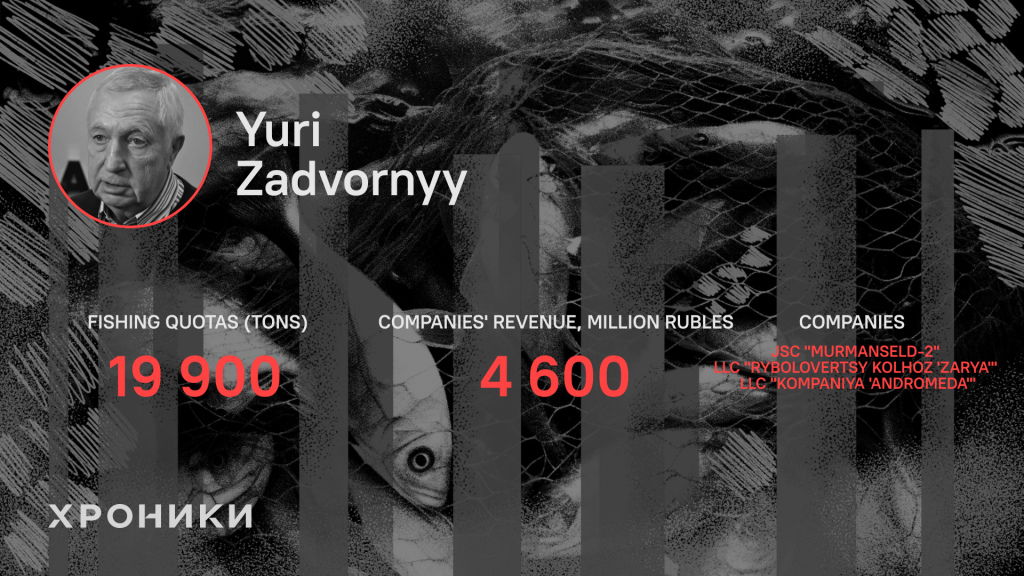
Seventh place goes to Yuri Zadvorny. ‘Chronicles’ dedicated an entire material to him. The entrepreneur once headed the state enterprise Murmanrybprom, which eventually disintegrated into several companies, of which only two survived. Our hero led one of them, and the other eventually went to the leader of this ranking, Vitaly Orlov. He is famous for losing his academic degree due to plagiarism.
Income: 4.6 billion rubles (48 mln.euro), profit: 1.1 billion rubles (11 mln.euro).
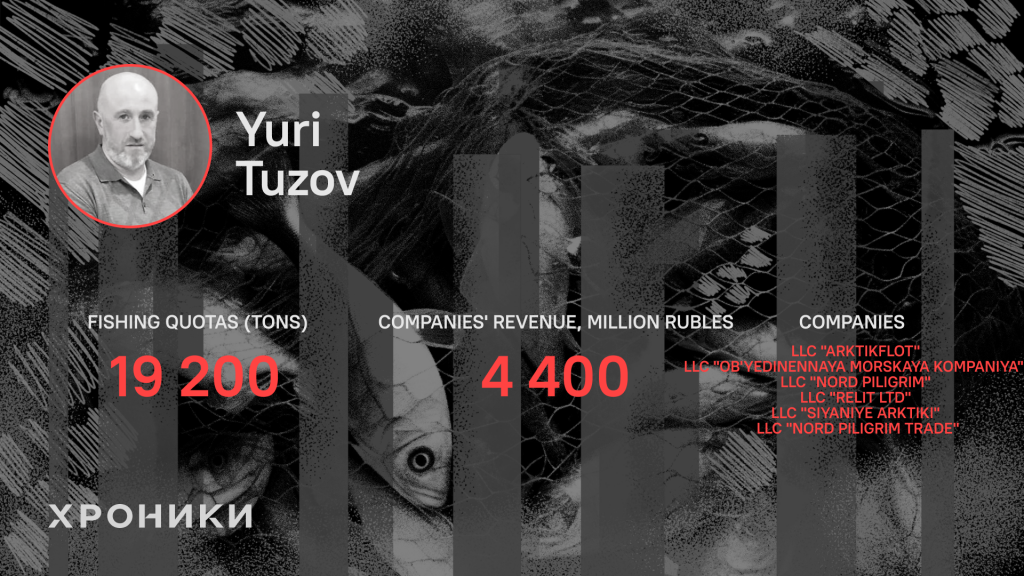
In eighth place is the Tuzov family. They even own one of the first private breweries in Murmansk, ‘Pilgrim.’ However, the head of the family, Yuri Tuzov, has been serving a nine-year sentence for extortion and kidnapping for several years. The sentence hasn’t significantly undermined the wealth of the Tuzovs. The income of their companies amounted to 4.4 billion rubles (46 mln.euro), with a profit of 900 million rubles (9 mln.euro).
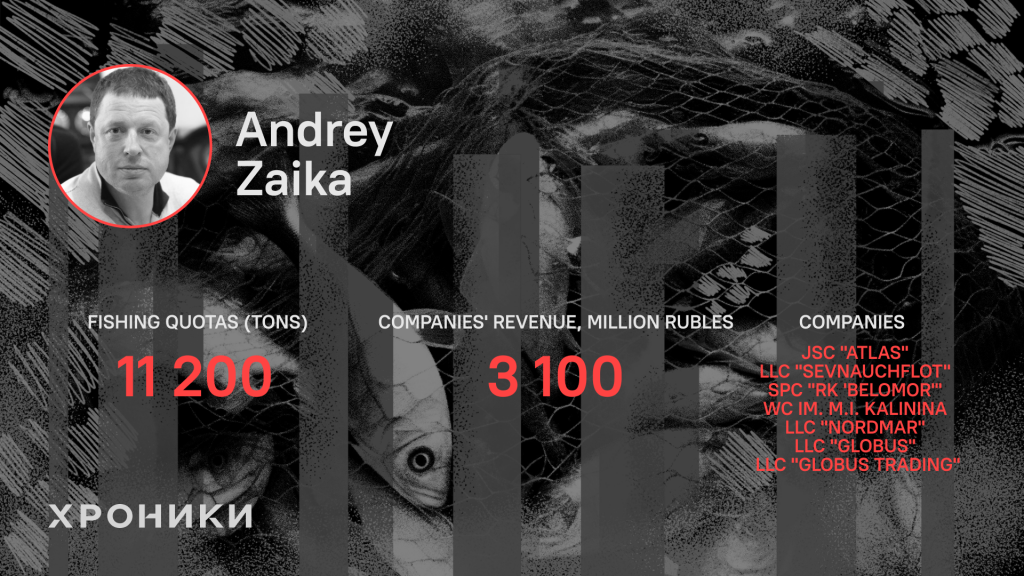
In ninth place is the chairman of the ‘Union of Fishing Collective Farms of the Arkhangelsk Region,’ Andrey Zaika. The future entrepreneur studied at the university together with the former business partner of the leader of this list, Vitaly Orlov, and the former deputy head of the State Fisheries Committee, Alexander Tugushev.
The income of Zaika’s companies is 3.1 billion rubles (32 mln.euro), with a profit of 900 million rubles (9 mln.euro).
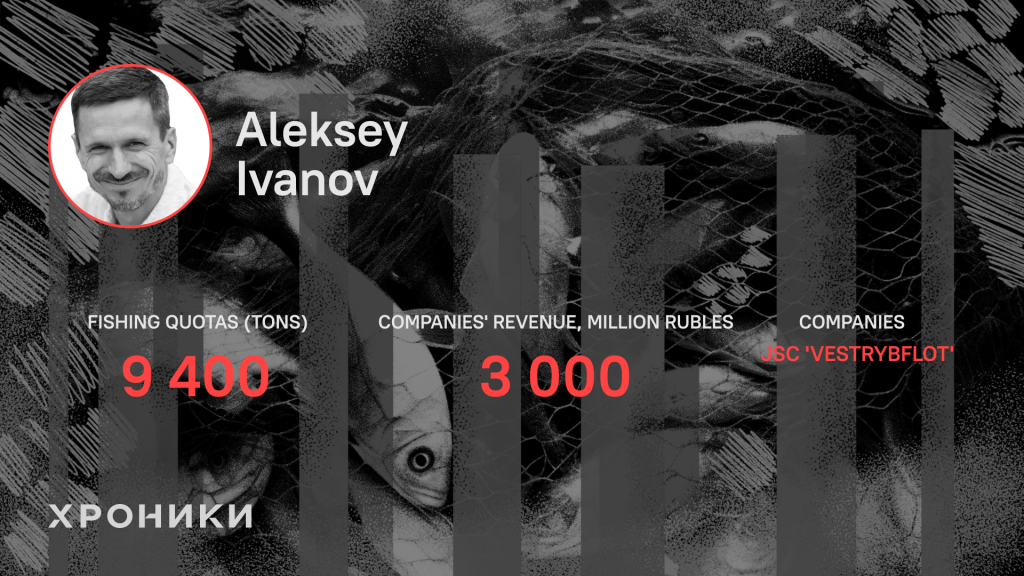
And finally, in tenth place is the lawyer and founder of the law firm ‘Ivanov, Makarov and Partners,’ Alexey Ivanov. He owns the largest stake in the Kaliningrad-based company ‘Vestrybfleet.’ According to the explanations to the balance sheet and the financial results report for 2022, he owns 48%. Officially, according to the data from the Federal Tax Service, he does not receive payments from ‘Vestrybfleet.’ However, ‘Chronicles’ knows that his father, Sergey Ivanov, a member of the company’s board of directors, was paid around 100 million rubles (1 mln.euro) in 2021.
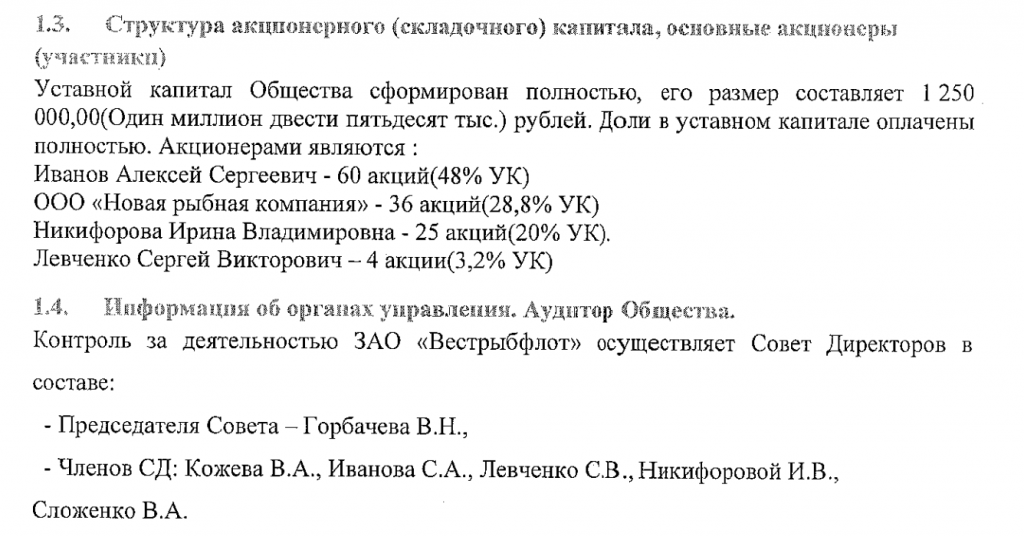
The face of the company is its CEO, and a member of the Chamber of Commerce and Industry of the Kaliningrad Region, Sergey Levchenko.
The company’s income was 3 billion (31 mln.euro), with a loss of 200 million rubles (2 mln.euro).
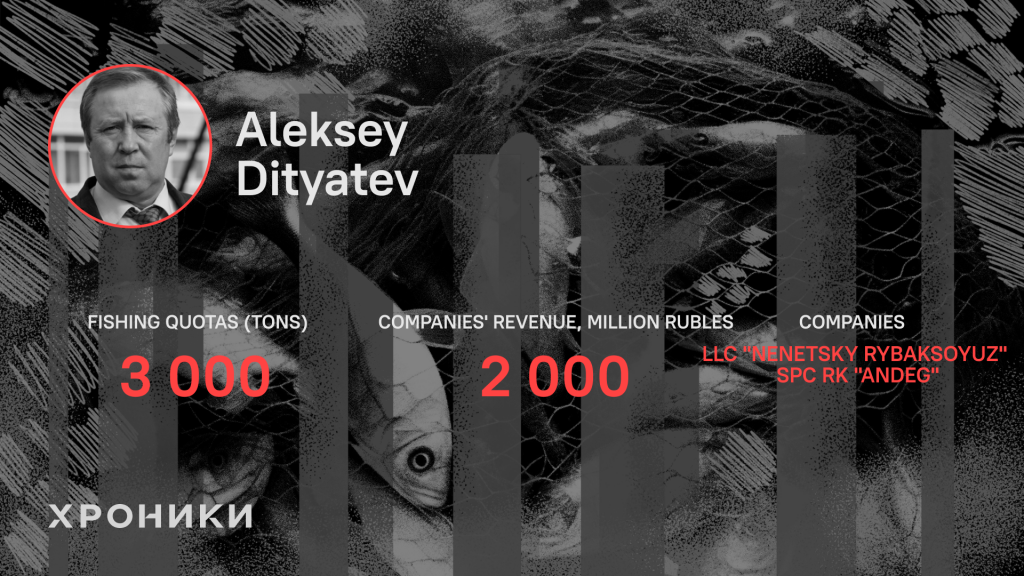
An honorary member of our list is the only fisherman from the Nenets Autonomous Okrug (NAO), and a member of the presidium of the regional political council of ‘United Russia,’ Alexey Dityatev. In 2010, he was under scrutiny by the prosecutor’s office: several fishing collective farms in the NAO accused him of fraud.
Dityatev’s companies earned more than 2 billion rubles (20 mln.euro), with a profit of less than 100 million rubles (1 mln euro).
Tricks with quotas
Seafood in Russia is harvested based on quotas. These quotas are assigned to companies for a long period (10-20 years). At the end of each year, various international commissions determine how much fish, crustaceans, and other marine products Russia can catch. Then, the Federal Agency for Fishery (Rosrybolovstvo) sets the catch volume for each company. If the catch volume for Russia increases during the year, the quotas are revised. These quotas can be transferred to other legal entities. Unfortunately, companies are not obligated to report whose quotas they are using.
“Chronicles. Media” decided to compile a top-10 list of companies with allocated quotas in the Northwestern part of Russia and check the prices for their fish on the wholesale market. To do this, we used the trading platform Fishnet.ru and data from the “Agroserver” service.
By comparing these prices with the official revenues of the enterprises, it can be understood to what extent these earnings correspond to reality and whether fishermen are involved in the buying and selling of quotas. An interviewee from “Chronicles,” familiar with the fisheries market, explained that if a company uses its quotas and sells unprocessed seafood in Russia, the organization’s revenue should be somewhat lower than the wholesale prices for the caught product.
If the revenue is higher than the wholesale cost of seafood, then the company is likely involved in processing the product (known to be done by ‘Norebo,’ ‘Za Rodinu,’ and businesses owned by Vladimir Khizhnyakov), or it sells the goods abroad and repatriates the income to Russia, or it acquires quotas from others. If the revenue is significantly lower than the wholesale prices, it may also indicate overseas trade without repatriating funds to Russia (‘Chronicles’ suspect Dmitry Ozersky and Gennady Mirgorodsky of this), or the sale of quotas to other companies.

The leader in the total catch volume is ‘Norebo’ owned by Vitaly Orlov. In 2023, the holding received quotas for 164.7 thousand tons. More than half of the quotas are for cod (88.3 thousand tons), followed by haddock (27.5 thousand tons), and pollock (25.8 thousand tons). Smaller quotas are allocated for capelin, perch, and shrimp.
The total wholesale value of these seafood products is 37.9 billion rubles (390 mln.euro), which is lower than the holding’s revenue of 54 billion rubles (560 mln.euro). It can be assumed that the company sells the catch abroad, as reported by Norwegian media.
The second place goes to the companies of Senator Igor Zubarev. Companies not formally owned by him received quotas for a catch of 71.5 thousand tons. The distribution is roughly similar to ‘Norebo,’ with 34.2 thousand tons of cod, 18 thousand tons of pollock, and 10 thousand tons of haddock. There are also quotas for halibut, capelin, perch, and shrimp.
The market value of these goods in Russia is 14.5 billion rubles (150 mln.euro). The companies’ revenue is 17.7 billion rubles (180 mln.euro). Again, the cost of fish is slightly less than the company’s revenue. According to the vessel tracking website MarineTraffic, Zubarev’s companies’ vessels frequently enter Norway. It can be assumed that the senator sells fish to Norway, where prices are higher than in Russia, thereby increasing the revenue of his companies.
Third place goes to the companies of former Deputy Prime Minister of the Russian Federation, Ilya Klebanov, which received quotas for 48.2 thousand tons. The quotas for pollock are almost the same as ‘Norebo’ – 24.4 thousand tons. However, the quotas for haddock and more expensive cod are significantly lower – 3 thousand tons and 9.5 thousand tons, respectively. On the other hand, the former politician catches more perch than anyone else in the Northwest – 5.7 thousand tons. However, Klebanov did not receive quotas for halibut and shrimp.
The cost of all this fish in Russia is 7.6 billion rubles (79 mln.euro), with the companies generating revenue of 12.7 billion rubles (13 mln.euro).
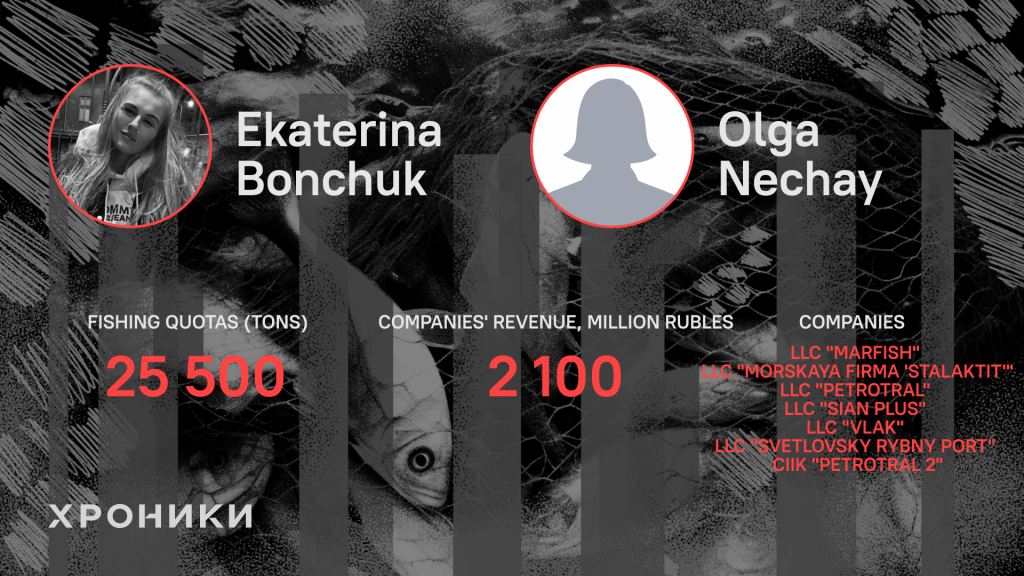
In fourth place are the companies of two close relatives from Kaliningrad – Ekaterina Bonchuk and Olga Nechai. Both women are leaders in quotas for herring in the Northwest, with more than 13 thousand tons. Additionally, sprats, a little cod, and flounder – a total of 25.5 thousand tons worth 3.3 billion rubles (34 mln.euro). This is significantly lower than the revenues of their fishing companies, which amounted to 1.7 billion rubles (1,8 mln.euro). Profit – 480 million rubles (5 mln.euro).
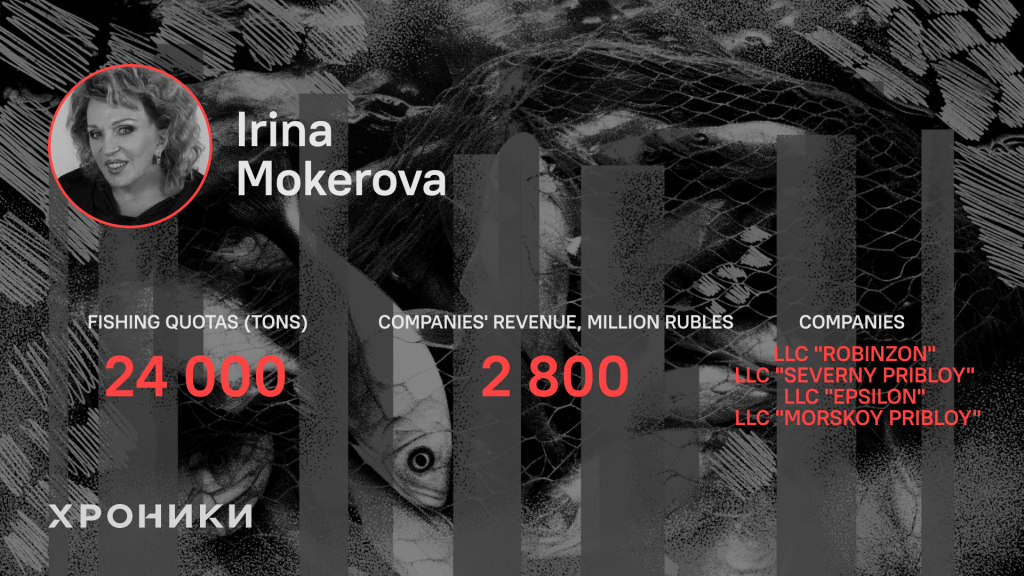
In fifth place is Irina Mokerova. She started her career in the USSR as a ship engineer, opened a ship repair company in the 1990s, and in the 2000s became involved in fishing, being elected as a deputy of Murmansk three times. Her companies received quotas for catching 24 thousand tons of fish. However, almost 21 thousand tons of them are cheap pollock. The market value of this fish in Russia is 1.9 billion rubles. The companies’ revenue is 2.8 billion rubles (29 mln.euro). However, 2022 was a year with a small loss of 68 million for the businesswoman (0,7 mln.euro).
Sixth place goes to the head of the Kaliningrad holding ‘Za Rodinu,’ Sergey Lyutarevich. His companies received quotas for 20.3 thousand tons of fish (including 15 thousand tons of sprats), worth 2.4 billion rubles in Russia (25 mln.euro). The revenue of the companies, in this case, was 6.4 billion rubles (66 mln.euro). Out of these, 4 billion (41 mln. euro) came from the revenue of the ‘Za Rodinu’ fish factory, which deals with canning. Thus, the revenues of Lyutarevich’s fishing companies correspond to the cost of fish.
Seventh place goes to the plagiarist Yuri Zadvorny. 19.9 thousand tons of fish for 4.8 billion rubles. Three-quarters of the quotas are for expensive cod – 15.2 thousand tons.
Eighth place is the business of the Murmansk Tuzov family. 19.2 thousand tons of quotas. The Tuzovs are the only northerners working in the Baltic, so they have quotas for herring and sprats. The market value of these seafood products is 5.6 billion rubles (58 mln.euro). The family’s revenue is 4.4 billion rubles 46 mln.euro).
Ninth place is Murmansk resident Khizhnyakov. Quota – 19 thousand tons of fish, mainly cod (13.9 thousand tons). The cost of all these goods at the retail level is 4.7 billion rubles (49 mln.euro). Revenue – 7.4 billion rubles (77 mln.euro).
In tenth place is the holding of Ozersky and Mirgorodsky. The ‘crab kings’ of the Northwest have quotas for 16.9 thousand tons of seafood. Their cost in Russia is almost 27 billion rubles (280 mln.euro). However, the official income amounted to only 7.7 billion (80 mln. euro), with a loss of 2.4 billion rubles (25 mln.euro). So, they have products worth 27 billion, but income of only 7,7 billion. Where did the rest of the money go? It can be assumed that it did not go to Russian accounts. The crab vessels of the businessmen, according to the MarineTraffic vessel tracking site, constantly enter Norway. Perhaps they are delivering their catch there?
***
The consumption of fish in Russia is steadily decreasing, and this is associated with a decline in the income of the population. Due to sanctions, supplies of tin for cans are running out, leading to an increase in prices for canned fish. Moreover, according to the chairman of the ‘Association of Coastal Fishermen and Farms of Murmansk’ Anatoly Evenko, the fleet is worn out by 80%. Since 2022, foreign shipyards have refused to repair Russian vessels, and domestic capacities are insufficient.